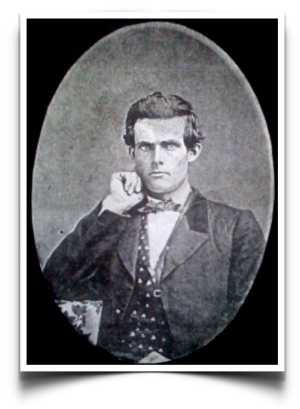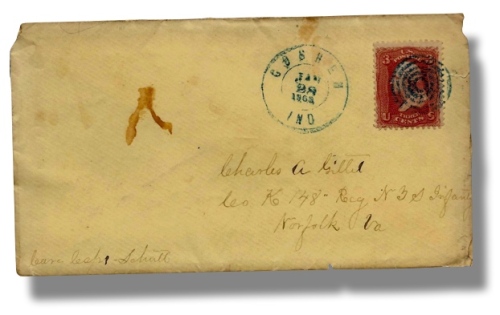I have not been able to confirm the identity of the young woman who authored this letter and signed it with the initials, “L. E. R.” For various reasons, however, I believe her residence was in Middlebury Township, Elkhart county, Indiana, when this letter was written in January 1863. It seems evident that she previously lived in Hopewell, Ontario county, New York. I slugged my way through the 1860 census pages for Middlebury and Goshen looking for her but concluded she must not have arrived there until after that census was taken.

She wrote the letter to her friend—possibly a cousin—Charles Ambrose Gillet who enlisted at the age of 21 in August 1862 at Hopewell, Ontario county, NY, to serve three years in Co. K, 148th NY Infantry. Charles was promoted to corporal almost immediately upon entering the service and was promoted to sergeant two years later. He was discharged for disability in May 1865 at Whitehall Hospital in Philadelphia. The following excerpt regarding Charles’ military service comes from a family memory: “He saw a lot of action, was taken prisoner, exchanged then wounded in sudden outburst of fighting by a ricocheting bullet during lunch hour in a barn during the Seige of Petersburg, Va. Was in battles of Cold Harbor, Appomattox. Was at Camp Whitehall, USGM, April 5, 1865 when word was received of Lincoln’s assassination.”
Charles was the eldest child of James McBurney Gillet (1816-1884) and Eliza Esther Berry (1818-1887); his mother a native of Rhode Island and the daughter of Samuel Foster Berry (1787-1864) and Lucy Stanton (1794-1875). Charles married Mary Etta Wakefield (1841-1920) in 1872.
The death of a soldier named “Leonard” is mentioned in this letter. She may be referring to Leonard Gillet who was buried in Grace Lawn Cemetery in Middlebury, Elkhart county, Indiana. The date of death on his headstone reads “died 1 February 1863” though this may be the date he was buried. I could find no military record for him, however, and no other family information.

TRANSCRIPTION
Addressed to Charles A. Gillet, Co. K, 148th Reg. N. Y. S. Infantry, Norfolk, Va.
Care of Capt. [Hiram] Shutt
Postmarked Goshen, Indiana
Goshen, Indiana
January 25, 1863
Dear Charlie,
Your kind letter was duly received and I regret that an answer has been delayed so long. Rubie Hoxie from Rhode Island has been visiting me during the past four weeks and I have not written a letter during that time so I hope you will excuse me under the circumstances.
We have just had a visit from Wayne. He was taken prisoner at Trenton, Tennessee, on the 20th of December. ¹ He had a commission to get up a cavalry company and was doing so about Jackson when the Rebels came in and surrounded them. About 300 soldiers—many that were from the hospital just getting around. They had one officer with them and fought well for a time, killing about 60 rebels. Then they threw a shell into the Depot where they were, setting it on fire and there was a large quantity of powder and cotton in it so they were obliged to surrender. Wayne said the Confederate Colonel told them they had fought like white men and as far as possible their personal property should be respected. He lost his horse and arms which he regretted much. [He was paroled and] is very anxious to be exchanged. [Wayne] has gone to Father’s now, I judge. He is is in the right capacity now, appears better, and is better pleased with himself than in anything he has ever undertaken before for he fights mentally too. He has been to Ontario [county] over this winter to attend that suit and has to go again in March. I hope to go too then but don’t know how it will be. My business has been good this winter. You probably know more about the people at home than I for I haven’t heard from their since Rie came back a month ago. They had just moved. I had a letter from Hattie Vose ² several weeks since. Holt doesn’t say anything about moving to Westerly [R.I.] but from what I can hear, I should judge that they would have to give up their place there and would go back on their old farm. Don’t say anything about it for it is a supposition and would displease them much to have it known.
We are having a mild sort of winter so far. No sleighing and very little skating. I was sorry not to see you last fall when in Hopewell. Did you know Eugenia Marks ³ was married? Also Anne Jones and Lecta Mattison. We are expecting them out here in the spring.
Rei and I are going to a New Light Meeting tonight where they wash feet. We have been to a Dunkard Dutch Meeting where they has soup. Isn’t it laughable.
Write again, Charlie, when you have leisure and I will be more prompt in future. We intend to call on John Mooney’s people this afternoon. They live about two miles from here.
You doubtless heard of Leonard’s death. I think he was a good soldier—brave and true—and is greatly lamented. His remains were embalmed and brought home for burial.
Accept our love and best wishes for your success and safe return. Yours, —L. E. R.
¹ After the Battle of Jackson, General Nathan B. Forrest led his troops to Trenton, Tennessee, with plans to take the Mobile and Ohio Railroad Depot. After putting up a brief fight in the depot area, Union defenders surrendered rather than face destruction by Forrest’s artillery. The Confederates then ransacked the courthouse and destroyed military supplies in the town. The official version of the engagement varies somewhat from that told by Wayne as the fire did not break out until after the surrender ceremony, which was obviously set by the federals to prevent the Confederates from gaining the spoils of war. Forrest, along with Maj. Strange, pistols in hand, forced the federal prisoners to fight the fire or be shot. The general then turned to Col. Fry (in command of the Union garrison at the time of surrender) to inform him that the culprits would be punished in the “most summary manner.” Forrest with his escort and the new green volunteers managed to captured Trenton as the rest of his unit was scattered out in the region on other missions. Forrest had no more than 275 men but captured 400 federal soldiers, including Colonels Fry and Hawkins, several field officers, 300 negroes, 1000 horses and mules, 13 wagons and ambulances, 7 caissons, 20,000 artillery rounds, 400,000 small-arms rounds, 100,000 rations of subsistence, large amounts of cavalry equipment, quartermaster stores, and soldier baggage, collectively valued at more than $500,000 (equivalent to $12,300,000 in 2017). Forrest paroled some 1,300 Union officers and enlisted men to return home, as the captured POWs were growing too numerous to manage. Some 800–900 remained prisoners and were marched under the command of Lt. Col. Nathan D. Collins to be turned over to the federals in Columbus, Kentucky.
² Harriet (“Hattie”) Amanda Vose (1837-1904) of Westerly, Washington county, Rhode Island, was the daughter of Joshua Vose (1806-1841) and Sarah Ann Berry (1813-1909). My presumption is that Hattie was Charles Gillet’s 2nd cousin.
³ Mary Eugenia Marks (1839-1902) married Gardner L. Archer (1837-1924) in late 1862 in Hopewell Township, Ontario County, New York.


